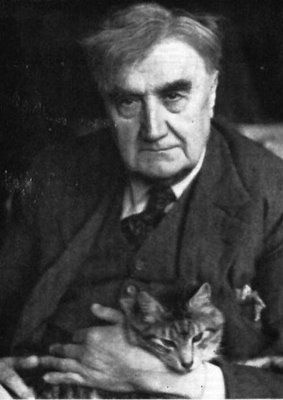
I was listening today to the Symphony No. 1 of Ralph Vaughan Williams (1872-1958), one of my three or four favorite composers. Though he wrote nine symphonies, he did not begin work on his first until he was in his late-30s. Subtitled "A Sea Symphony," it is worked up around several texts from Walt Whitman's "Leaves of Grass." Other composers have used Whitman's poetry as a text source (Paul Hindemith's Requiem for Those We Love written on Whitman's When lilacs last in the dooryard bloom'd, and commissioned upon the death of FDR, falls readiest to hand), but none more skillfully than RVW. Whitman (at least the texts I've seen) has a kind of pantheism that seems to invite large-scale adaptation. And so it is with A Sea Symphony, which begins, after a trumpet flourish, with a full choir belting with rakish modulation "Behold the sea itself!" followed by a glorious and harmonically-enveloping full orchestra treatment.
I often wonder at the self-assurance that must be required to write for a large orchestra and full chorus (plus two vocal soloists), and to write boisterously and with confidence. I suppose there is something psychoanalytically telling about my fear of making banal statements very loudly (this blog is rather like singing in the basement shower, I guess). But this is magnificent, glorious music, music which grabs the listener by the shoulders and makes direct eye contact while making its statement clearly and with force. What kind of person does this? Someone insufferably egomaniacal like Wagner? Someone compelled by external forces like Bach? Does a normal person do this? My point is not to denigrate the composition student who writes intimate, personal little piano pieces, but these I can at least grasp. A symphony written for a cast of 300 is another matter.
Beyond all this, RVW has something distinctly, identifiably English (or British) about his writing. How is this possible? How can one determine the country of origin of a piece of music, except maybe by stylistic similarity to others from the same place? But in this case, RVW seems a bit like some others (Holst, Elgar, etc.) only... moreso. Is a thing "Russian" sounding because it is in a relentless minor mode and sounds bleak? And yet we do not confuse one of Mahler's minor-key symphonies for a Rachmaninov. I know the French organ school I so love has a particular harmonic palate, a kind of musical milieu the denizens of which I can usually identify at first exposure; but in this case there is also the organ itself--usually a reedy French Cavaille-Coll on the radio recording--to help us with the association. RVW gets no such help. And yet he is distinctive, both as to his writing style and as to his sonic association with his countrymen.
I've been sick for over a week. I'm able to pose the question but am not up to answering it.
3 comments:
I want to say instrumentation makes Vaughan Williams English. But then, that's not quite right either.
Try listening to some Finzi, if you haven't already, and hear the same thing; it's really rather creepy.
I have wondered the same thing for years. Though not whether or not a piece sounds like it's from a country, but how the hell they do it. It's baffling, mesmerizing and haunting all at the same time.
This post made me want to play in an orchestra again.
I'm not familiar with Finzi (I know the name, but have only an assorted piece or two in my whole collection) so that's a fun recommendation; someone new to explore!
I wrote a few songs back in the day when I played in a band in Minneapolis. A rock song, especially a bad one, is light years from serious composition. And it bears pretty much no relation to writing a symphony. But the idea of coming up with a tune or simple development is not completely foreign to me. But getting from there to this work is like the quantum leap. Amazing.
Post a Comment